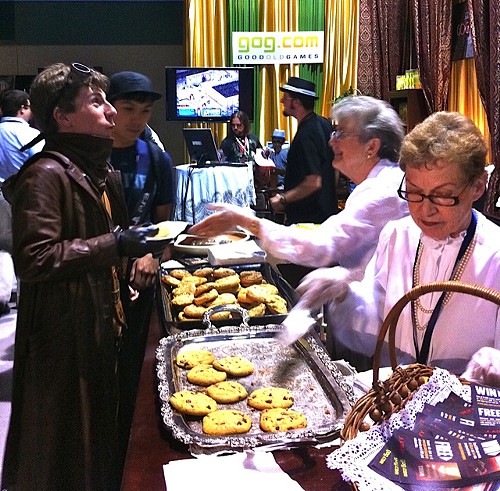During the December/January slowdown, Geek Feminism is re-publishing some of our highlights from earlier in the year. This post originally appeared on February 28, 2011.
From The Advantage Of Dual-Identities (A Case Study of Nabokov), I bring you this quote:
It’s also important to note that the advantage of having a “dual-identity” – being both a novelist and a scientist, for instance – isn’t limited to Nabokov. According to a study led by Jeffrey Sanchez-Burks, a psychologist at the University of Michigan, people who describe themselves as both Asian and American, or see themselves as a female engineer (and not just an engineer), consistently display higher levels of creativity.
So as a female, half-asian all-canadian researcher, I’m clearly better at creativity than all those boring white dude researchers?
 … I don’t even know exactly where to begin on this. So I’m going talk about Bones for a minute. I’ve been watching it with my sister lately while we do other things (crochet, do mending, wander around looking for things in an mmo, eat dinner, etc.) and the other day she pointed out that she loves how the show deals with Angela, or really, how it doesn’t. See, Angela Montenegro is the team’s artist: she does sketches of the victims. But she doesn’t stop there: she also coaxes data off broken camcorders and swallowed flash drives doing digital forensic work. She’s an adept computer programmer who writes software that helps visualize and model what happened during a crime. What’s cool about Bones is that it’s totally taken for granted that she can be an artist and a coder. (And really, pretty much whatever else she wants to be.)
… I don’t even know exactly where to begin on this. So I’m going talk about Bones for a minute. I’ve been watching it with my sister lately while we do other things (crochet, do mending, wander around looking for things in an mmo, eat dinner, etc.) and the other day she pointed out that she loves how the show deals with Angela, or really, how it doesn’t. See, Angela Montenegro is the team’s artist: she does sketches of the victims. But she doesn’t stop there: she also coaxes data off broken camcorders and swallowed flash drives doing digital forensic work. She’s an adept computer programmer who writes software that helps visualize and model what happened during a crime. What’s cool about Bones is that it’s totally taken for granted that she can be an artist and a coder. (And really, pretty much whatever else she wants to be.)
So I guess while I fundamentally agree that having multiple “identities” is a huge asset to my work and creative abilities, I sort of feel like… why are they making such a big deal about this, as if it’s some hugely abnormal thing. Why can’t they just accept that Angela can draw and code? Why do people insist on compartmentalizing people into single skill sets? I can drive a car and code and no one thinks that’s weird, but plenty of people have commented with surprise that I can edit a magazine (yes, I used to do this) and write code. Hello, world?
The article just makes me a little uncomfortable. This worst part is the paragraph about how the US will be overrun by mixed-race folk like me with superior creative skills — awkward racial superiority with a different spin — but even the study methodology doesn’t quite sit right with me at a first reading. But maybe the article is simply a journalistic reflection of research into of a real logical fallacy that people often employ: the assumption that one must specialize in only one skill to be the best person one can be. That’s one of those things that might be true for programs, but I really haven’t seen much evidence of it being true for people.
Despite my issues with the article, I think it’s got a nice take-away message: it’s a-ok, normal, and maybe even superior to have and use your multiple identities. And don’t let incredulous folk tell you otherwise.
This was originally posted on my personal blog.



 Most male geeks believe that they are subverting traditional masculinity by reclaiming and self-identifying with the term “geek”. For most male geeks, geek identity is defined partly as a rejection of the “jock” identity. According to the traditional high school male social hierarchy, jocks are high-status males and male geeks are low-status males; jocks are alpha males and male geeks are beta males; jocks are masculine and male geeks are “effeminate”. Thus, when a man proudly self-identifies as a “geek” in response, what he is doing is redefining what it is to be a man, redefining geek identity as masculine.
Most male geeks believe that they are subverting traditional masculinity by reclaiming and self-identifying with the term “geek”. For most male geeks, geek identity is defined partly as a rejection of the “jock” identity. According to the traditional high school male social hierarchy, jocks are high-status males and male geeks are low-status males; jocks are alpha males and male geeks are beta males; jocks are masculine and male geeks are “effeminate”. Thus, when a man proudly self-identifies as a “geek” in response, what he is doing is redefining what it is to be a man, redefining geek identity as masculine.